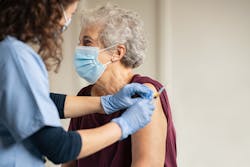To track any connection between possible adverse events and COVID vaccinations, the Centers for Disease Control and Prevention (CDC) is relying on a system that uses electronic health records from several large integrated healthcare systems to proactively search de-identified medical records from a population of about 12 million people.
Organizations that share data through the CDC’s Vaccine Safety Datalink (VSD) network include five Kaiser Permanente regions, HealthPartners in Minneapolis, the Marshfield Clinic in Wisconsin, Harvard Pilgrim Health Care Institute in Boston and Denver Health in Colorado.
The CDC explains that the VSD uses electronic health data from each participating site. This includes information on vaccines: the kind of vaccine given to each patient, date of vaccination, and other vaccinations given on the same day. The VSD also uses information on medical illnesses that have been diagnosed at doctors’ offices, urgent care visits, emergency department visits, and hospital stays. The VSD conducts vaccine safety studies based on questions or concerns raised from the medical literature and reports to the Vaccine Adverse Event Reporting System (VAERS). When there are new vaccines that have been recommended for use in the United States or if there are changes in how a vaccine is recommended, the VSD will monitor the safety of these vaccines.
According to a report on the Kaiser Permanente website, the surveillance involves casting a wide net through electronic patient records, searching for specific potential adverse health effects, such as strokes or anaphylaxis (severe allergic reaction). Eight healthcare institutions that participate in the VSD share weekly data reports on the selected diagnoses, and data analysts search for any possible connection with a COVID-19 vaccination.
Kaiser Permanente’s Vaccine Study Center has been evaluating vaccines for more than 30 years and carrying out rapid response studies through the Datalink for more than a decade.
Nicola Klein, M.D., Ph.D., is the director of Kaiser Permanente’s Vaccine Study Center. The report quotes her as saying that KP has been carrying out Rapid Cycle Analysis (RCA) studies through the Datalink for more than a decade. The center has extensive experience in examining data sets, identifying specific incidents, and carrying out chart reviews to determine whether a likely adverse vaccine event took place, she said.
“The Vaccine Safety Datalink is the premier system in the United States, and arguably in the world, for active, real-time safety surveillance of vaccines,” Klein noted. In 2008, Klein’s group identified an increase in fever seizure in toddlers who received a combination measles, mumps, rubella and varicella (MMRV) vaccine using this same Rapid Cycle Analysis approach.
Results of the ongoing analyses will be shared within the VSD network, which includes CDC representatives, during its weekly calls. Any potential safety concerns would be discussed by CDC’s Advisory Committee on Immunization Practices (ACIP), which holds regular public meetings.
In a separate interview published on Kaiser Permanent’s website, Jennifer Nelson, Ph.D., director of Kaiser Permanente Washington Health Research Institute’s Biostatistics Unit, described how the VSD works. “The VSD team, which includes researchers from all the participating organizations, can also do “rapid cycle analysis” using weekly data reports on specific health problems identified by VAERS [Vaccine Adverse Event Reporting System], experience with the same vaccine in other countries, or prior experience with similar vaccines in the United States,” she said. “Our colleagues at Kaiser Permanente Northern California’s Vaccine Study Center are leading these rapid analyses, which can determine if the rate of any adverse events among vaccinated people is higher than among comparison groups.”
An affiliate professor of biostatistics at the University of Washington, Nelson was recently appointed to serve on Moderna’s External Safety Advisory Board for their COVID-19 vaccine program in 2021.
Nelson also was asked why the VSD focuses on integrated health systems like Kaiser Permanente?
“Many research organizations struggle to get records on vaccination because people can get their shots from a variety of providers. But organizations like Kaiser Permanente have access to complete health records on large, defined populations,” she explained. “This allows VSD to analyze data on patients’ vaccinations, prescription medications, lab results, and medical diagnoses such as stroke, heart attack, and so on. Also, our claims data can tell us if patients are getting vaccinations outside the system.”
In addition, the Kaiser Permanente research institutes have the biostatistical expertise that’s needed to design complex studies using several different kinds of data from various organizations, she said. “Working on the VSD has given my colleague Andrea Cook and me the opportunity to lead the development of new statistical methods for actively monitoring electronic health records for rare adverse events across distributed data networks.”
In May 2020, the Marshfield Clinic published a report noting that researchers at the Center for Clinical Epidemiology and Population Health in Marshfield Clinic Research Institute are using the VSD to assess the medical records of anyone diagnosed with or testing positive for COVID-19 to determine what health conditions put people at most risk for serious COVID-19 disease.
The study will analyze the medical records of patients to see if comorbidities such as diabetes, lung and heart conditions put people at increased risk of a severe COVID-19 case that could lead to hospitalization and death in some cases.


